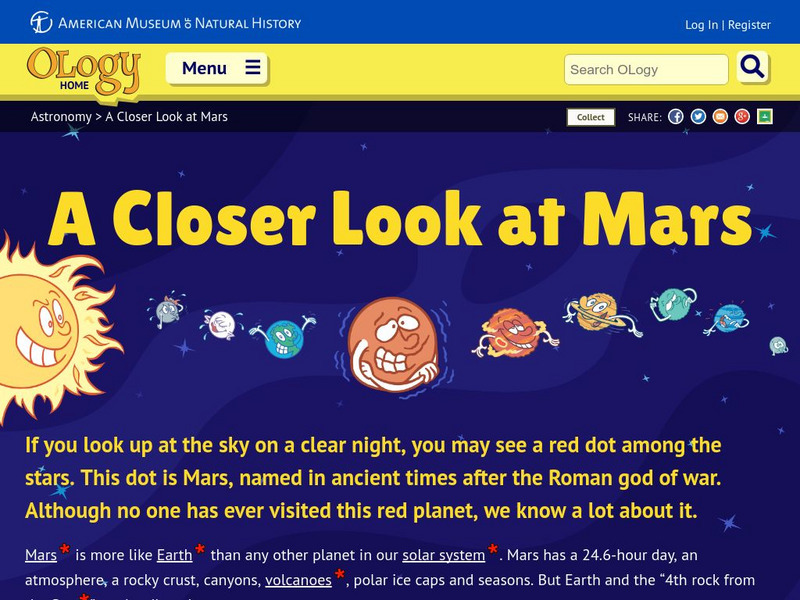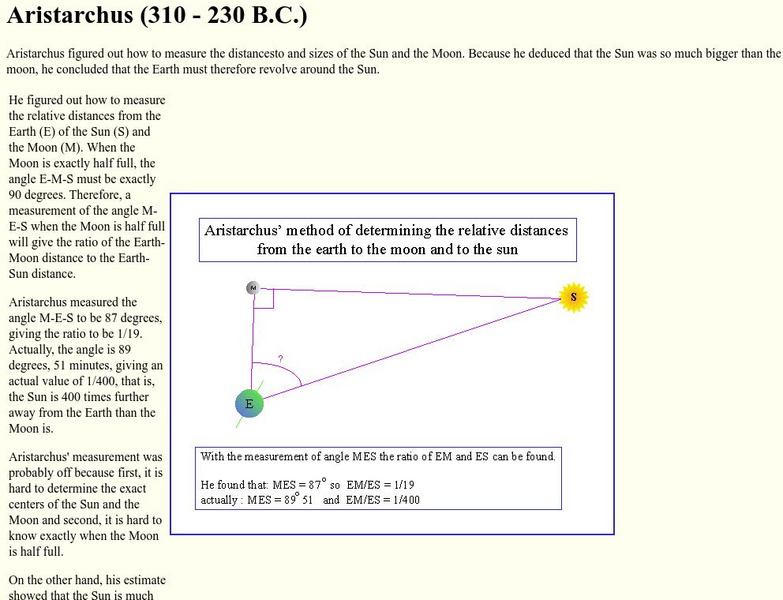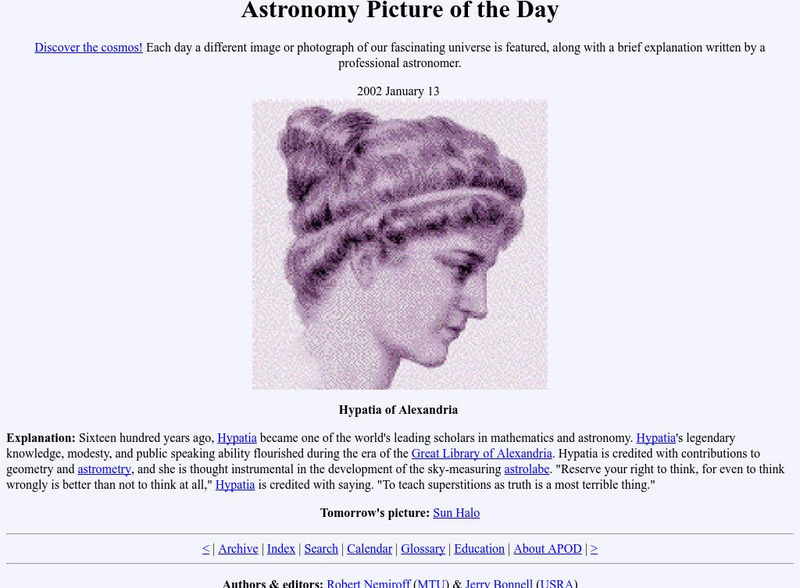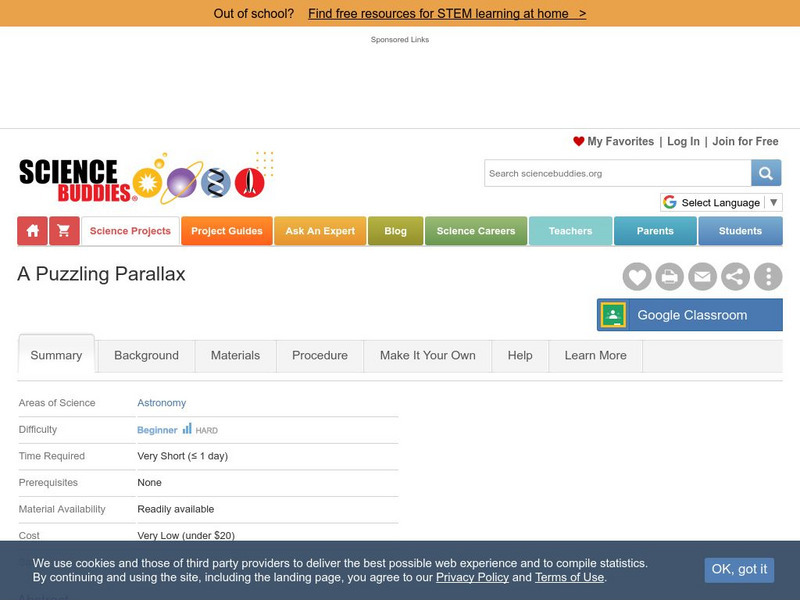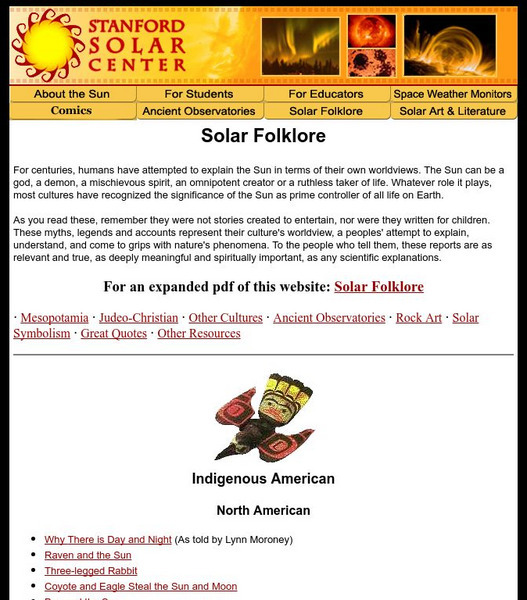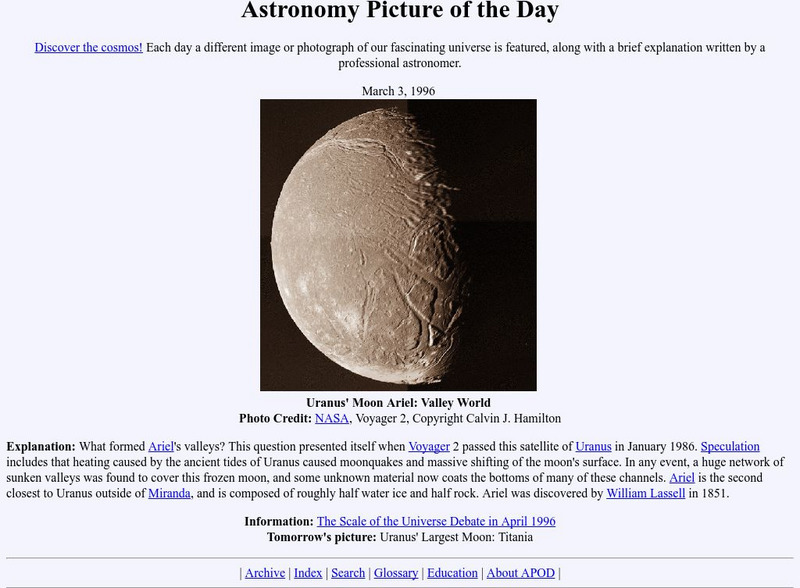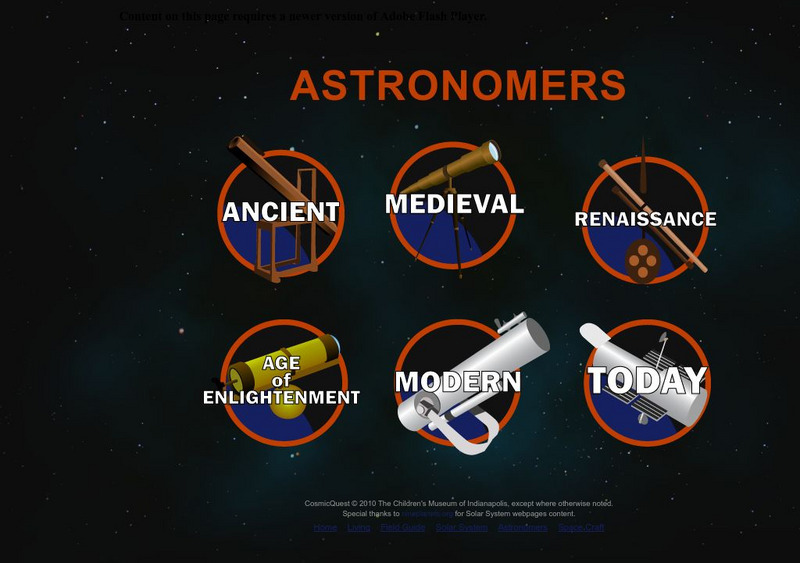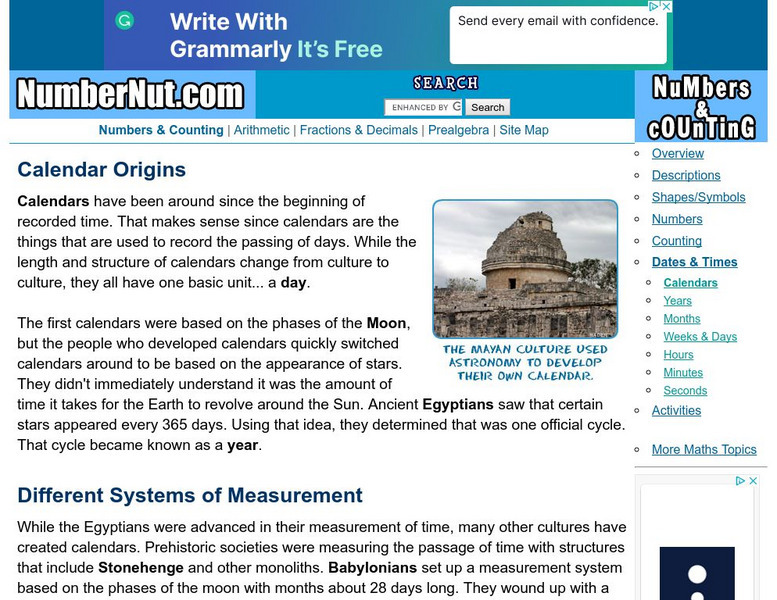Other
Sky Server: About Astronomy
This site from SkyServer provides the history of astronomy as well as links to mapping the sky, galaxies, cosmic structures and much more. Several pictures are given, and the article is medium in length.
Georgia Department of Education
Ga Virtual Learning: A Brief History of Astronomy
In this interactive module students will explore what different ancient cultures believe was an explanation of the stars and planets. They will look at how the work of Nicolas Copernicus revolutionize the world of astronomy and learn how...
American Museum of Natural History
American Museum of Natural History: O Logy: A Closer Look at Mars
If you look up at the sky on a clear night, you may see a red dot among the stars. This dot is Mars, named in ancient times after the Roman god of war. Although no one has ever visited this red planet, we know a lot about it. This site...
World History Encyclopedia
World History Encyclopedia: Greek Astronomy
Looks at the history of Greek astronomy from the 4th century BC on, and the major figures who contributed ideas. Includes a timeline of Greek science.
Cornell University
Cornell University: Astronomy: Aristarchus
This site from Cornell University provides a discussion of how Aristarchus arrived at his conclusions of the distance from the Earth to the Sun and Moon. Also has his methods for determining the size of the Moon and the Sun.
University of St. Andrews (UK)
University of St. Andrews: Mac Tutor History of Mathematics Archive
The University of St. Andrews, Scotland, presents hundreds of biographies of famous mathematicians, histories of math in various cultures, and interesting facts on the development of important math concepts. This is a huge reference....
Ducksters
Ducksters: Astronomy for Kids: Constellations
Kids learn about the constellations in the science of astronomy. These stars that form patterns when viewed from the Earth have been studied since ancient times.
NASA
Nasa: Astronomy Picture of the Day: Hypatia
Learn more about Hypatia when you check out this resource. This site features a picture and a brief synopsis of this famous scientist.
Other
Ancient Greek Philosophy: Thales of Miletus
Includes a short summary of the life and work of the Greek philosopher Thales of Miletus. Discusses his life, work in Astronomy and Mathematics, and view of water and pantheism. Also includes a couple of quotations that make reference to...
Other
Ellinogermaniki Agogi: Eratosthenes Experiment
A profile of the ancient Greek mathematician, geographer, and astronomer, Eratosthenes. Looks at his many accomplishments, including measuring the circumference of the Earth and the distance to the Moon and the Sun. Includes links to...
University of Oregon
University of Oregon: Greek Science: Early Cosmology
Discusses the evolution of ideas about the cosmos, from the Magic Cosmology of the Neolithic age to the stage of Mythical Cosmology, to the Geometric Cosmology of the ancient Greeks. The third stage advocated a rational approach to...
Science Buddies
Science Buddies: A Puzzling Parallax
Did you know that ancient astronomers could measure the distance to other stars? They could also distinguish between stars and planets. How could they do that without modern technology of telescopes? See if you can discover the link...
Science Buddies
Science Buddies: Changing Constellations
Do you like to look up into the night sky? There are so many stars, it can be mind boggling. Some ancient people marked time by the changes in star patterns. We still use changes in constellation patterns to mark astronomical time. This...
Science Buddies
Science Buddies: Which Stars Can You Use for Navigation
A great science project from Science Buddies that examines how ancient peoples navigated without the benefit of a GPS. Find out which stars are important in navigation in the northern and southern hemispheres. The Science Buddies project...
Stanford University
Solar Folklore
Folktales from many cultures around the world about the sun. There is also information available about ancient astronomy.
NASA
Nasa: Astronomy Picture of the Day: Uranus's Moon Ariel
Provides a brief overview of Ariel, one of Uranus's moons. Details how its deep valleys were formed. A NASA astronomy picture of the day.
Children's Museum
Children's Museum of Indianapolis: Cosmic Quest: Astronomers
Explore the achievements of notable astronomers beginning with ancient times through modern space explorers.
The History Cat
The History Cat: Mayan Achievements
Discusses the Maya system of astronomy and their calendar.
CK-12 Foundation
Ck 12: Earth Science: Revolutions and Rotations of the Earth Study Guide
[Free Registration/Login may be required to access all resource tools.] Summarizes the key points about how our understanding of the Earth's movements evolved from ancient times and what we know today. Includes some questions to check...
Discovery Education
Discovery Education: Lesson Plans Library K 5
This resource presents a lesson plan library which holds hundreds of lesson plans organized by grade level and subject area. Often rooted with an Internet research piece, each lesson plan contains specific objectives, procedures,...
NumberNut
Number Nut: Calendar Origins
History and mathematics merge in this lesson that explores the origin of the calendar. Learn how it all got started in this detailed lesson that includes a simple months of the year game and a more challenging time conversion game. Both...
University Corporation for Atmospheric Research
Ucar: High Altitude Observatory: Aristarchus of Samos (310 230 Bc)
A brief biography and discussion of Aristarchus' theories provided here.
Curated OER
Ancient Greek Philosophy: Thales of Miletus
Includes a short summary of the life and work of the Greek philosopher Thales of Miletus. Discusses his life, work in Astronomy and Mathematics, and view of water and pantheism. Also includes a couple of quotations that make reference to...
Smithsonian Institution
National Air and Space Museum: Exploring the Planets: Early Discovery
This section of the exhibition gives the history of the discovery and study of space starting with the Greeks and Romans through to the early 1900's.




